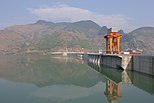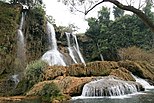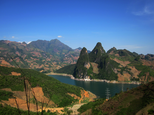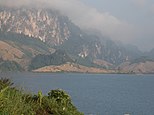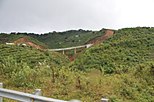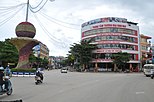Sơn La province
This article needs additional citations for verification. (December 2024) |
Sơn La | |
|---|---|
Mường La Mountain • Sơn La Dam • Dải Yếm Waterfall • Bản Phúc Mountain • Mộc Châu Mountain • Quỳnh Nhai Mountain pass • Pha Đin Mountain pass • Sơn La City | |
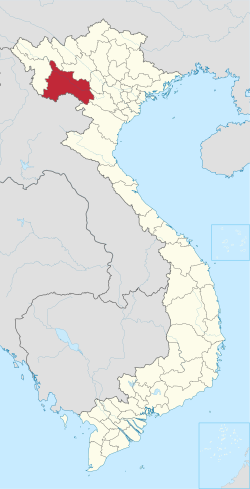 Location of Sơn La within Vietnam | |
 | |
| Coordinates: 21°10′N 104°0′E / 21.167°N 104.000°E | |
| Country | |
| Region | Northwest |
| Capital | Sơn La |
| Subdivision | 1 city, 11 rural districts |
| Government | |
| • Type | Province |
| • Body | Sơn La Provincial People's Council |
| • Chairman of People's Council | Nguyễn Thái Hưng |
| • Chairman of People's Committee | Nguyễn Đình Việt |
| Area | |
• Province | 14,109.82 km2 (5,447.83 sq mi) |
| Population (2023)[2] | |
• Province | 1,313,300 |
| • Density | 93/km2 (240/sq mi) |
| • Urban | 202,589 |
| Ethnic groups | |
| • Thái | 53.61% |
| • Vietnamese[4] | 16.26% |
| • Mông | 16.06% |
| • Mường | 6.78% |
| • Xinh Mun | 2.17% |
| • Others | 5.12% |
| GDP[5] | |
| • Province | VND 47.223 trillion US$ 2.051 billion |
| Time zone | UTC+7 (ICT) |
| Area codes | 212 |
| ISO 3166 code | VN-05 |
| HDI (2020) | (60th) |
| Website | www |
Sơn La is a province nestled in the northwestern part of Vietnam.
History
[edit]Pre-1946
[edit]By Đại Việt sử ký toàn thư, before the 15th century, the area where Sơn-la Province is now belongs to a kingdom called as Muaeng Ngõu-hỡu (mường Ngưu-hống, "Cobra kingdom"). However, in Tai epics, this land was called Muaeng-mol (Mường Mỗi, "barbarian land"). Because before the Tai tribes migrated, it was home to a group called Xá people ("commune men").
On May 24, 1886, the French provisional protection government in Tonkin decided to divide Hưng Hóa province into many parts. Accordingly, Sơn-la Province has been established based on the area of a part of Hưng-hóa Province with some rugged lands without people living in the eastern area of Lao kingdom. The reason it was called Sơn-la is because the capital of the province was located in Muaeng-la (Mường La). However, although called the province, but in reality, this area was operated like a military zone. The head of the province was also called the commander, with the rank of captain. In particular, all administrative activities used French language.
On February 27, 1892, Sơn-la Province was separated into two small military zones, Phong-thổ (Muaeng-lae) and Vạn-bú (Muaeng-va). On October 10, 1895, Vạn-bú Province (Vạn Bú tỉnh) was officially established, with the headquarters located at an address called Tạ-bú (Muaeng-tae). The position of the head of the province at this time was the minister plenipotentiary (công-sứ toàn-quyền đại-thần).
On August 23, 1904, it was renamed to Sơn-la Province (Sơn La tỉnh), the provincial capital transferred to the place called as Sơn-la Town (Sơn La thị xã). From then until 1946, the province did not have any special developments, except for some prisoners' protests at Sơn-la Prison (xà-lim Sơn-la).
1946 to present
[edit]After chasing Việt-minh forces from government agencies, the French provisional government in Indochina for the first time allowed a native person as the Governor of Sơn-la Province (Sơn La tỉnh trưởng). Mr Bạc Cầm Quý (Monsieur Gouverneur Bac-câm-Qui in French administrative documents) was a Taykhao man. In 1948, three provinces Lai-châu, Phong-thổ and Sơn-la were merged into the Tai Union ("Sipsong-chau Tay", then "Siphoc-chau Tay").
In 1953, after France went bankrupt in Nà-sản, the Vietminh forces basically controlled Sơn-la. This province was temporarily merged into Việt-bắc Inter-zone (liên khu Việt Bắc). From 1955 to 1975, Sơn-la belonged to the South of the Northwest Autonomous Region (khu tự trị Tây Bắc).
In 1975, when the Autonomous Region was dissolved, Sơn-la Province re-established what based on the former Sơn-la Province and two communes of Nghĩa-lộ Province (which also dissolved).
On September 3, 2008, Sơn-la Town was upgraded and expanded to Sơn-la City (thành phố Sơn La).
On February 1, 2025, Mộc-châu District was changed to Mộc-châu Town (thị xã Mộc Châu).
Culture
[edit]Sơn-la is recorded as the place with the highest number of ethnic groups in Vietnam's provinces, so it possesses a surprising diversity of cultural identity, especially ancient writing.
According to epics such as Táy pú xớc, Quắm tố mướng and Phiết mướng, Sơn-la used to be a border dispute between the Tai tribes and Xá people. The Xá men was expelled by the Tai forces to Mai-châu. The Tai people celebrates the event with an annual horse racing festival. This is considered the most bustling cultural activity in Sơn-la in every spring.
Geography
[edit]Tourism
[edit]Sơn La Province renowned for its stunning landscapes and rich cultural heritage. This area is characterized by rolling hills, lush valleys, and terraced rice fields. The province is home to diverse ethnic communities, including the Tai, Hmong, and Muong people.
Besides, Sơn La Dam was the largest hydroelectric power station in Southeast Asia.[7] It is located in this province.
Administration
[edit]
Sơn La is subdivided into 12 district-level sub-divisions and 204 commune-level sub-divisions:
| Administrative divisions of Sơn La | ||||||||||||||||||||||||||||||||||||||||||||||||||||||||||||||||||||||
|---|---|---|---|---|---|---|---|---|---|---|---|---|---|---|---|---|---|---|---|---|---|---|---|---|---|---|---|---|---|---|---|---|---|---|---|---|---|---|---|---|---|---|---|---|---|---|---|---|---|---|---|---|---|---|---|---|---|---|---|---|---|---|---|---|---|---|---|---|---|---|
|
|
|||||||||||||||||||||||||||||||||||||||||||||||||||||||||||||||||||||
See also
[edit]Notes and references
[edit]- ^ Biểu số 4.1: Hiện trạng sử dụng đất vùng Trung du và miền núi phía Bắc năm 2022 [Table 4.1: Current land use status in the Northern Midlands and Mountains in 2022] (PDF) (Decision 3048/QĐ-BTNMT) (in Vietnamese). Ministry of Natural Resources and Environment (Vietnam). 18 October 2023. – the data in the report are in hectares, rounded to integers
- ^ "Area, population and population density by province". General Statistics Office of Vietnam. Retrieved 12 April 2024. – Interactive table which you can view by making your selection in three boxes: (1) Cities, provinces: Select all; (2) Year: Select 2022; (3) Items: Select all.
- ^ General Statistics Office of Vietnam (2019). "Completed Results of the 2019 Viet Nam Population and Housing Census" (PDF). Statistical Publishing House (Vietnam). ISBN 978-604-75-1532-5.
- ^ Also called Kinh people
- ^ "Tình hình kinh tế, xã hội Sơn La năm 2018". Cục Thống kê tỉnh Sơn La. Retrieved 10 May 2020.
- ^ "Human Development Index by province(*) by Cities, provincies and Year". General Statistics Office of Vietnam. Retrieved September 28, 2024.
- ^ "Huge hydro plant starts operation in Vietnam, says official". Intellasia News Services. 2010-12-22. Retrieved 2011-01-22.


